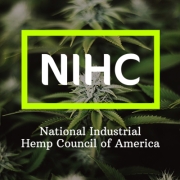If you’ve been following our work, you know that we’ve been pushing for commonsense and sensible regulations from Food and Drug Administration (FDA) for cannabidiol (CBD).
And like you, we’ve been waiting.
Congress has sought to act and fulfill the role of the FDA by legislating. Earlier this Congress, Congressman Kurt Schrader (D-CO) along with Morgan Griffith (R-VA) and 18 other original bipartisan co-sponsors introduced legislation that would make CBD lawful for use as a supplement unless otherwise directed by the FDA. The bill has been referred to the House Energy and Commerce Committee where it has yet to have a hearing.
This week, Senators Ron Wyden (D-OR), Rand Paul (R-KY) and Jeff Merkley (D-OR) introduced the Hemp Access and Consumer Safety Act that would deem CBD not only as a supplement, but also as an additive in food. The Senate bill introduced this week also puts a premium on safety and transparency by requiring manufacturers to comply with all FDA regulations and products be labeled properly.
“CBD products are legally being used and produced across the nation. Yet because the FDA has failed to update its regulations, consumers and producers remain in a regulatory gray zone.”
– Senator Ron Wyden (D-OR)
“CBD products are legally being used and produced across the nation. Yet because the FDA has failed to update its regulations, consumers and producers remain in a regulatory gray zone,” Senator Wyden said. “It’s been more than two years since I worked with colleagues to have Congress legalize hemp and hemp-derived products. It’s long past time for the FDA to get with the program, for the sake of American consumers and farmers.”
“Hemp-derived CBD products and businesses have earned their recognition in the marketplace, but the FDA, unfortunately, hasn’t treated them like any other food additive or dietary supplement,” Dr. Paul said. “The Hemp Access and Consumer Safety Act directs the FDA to regulate hemp products properly and provides a huge relief to hemp farmers, processors, and merchants.”
“Every day that the FDA drags its feet to update its CBD regulations, hemp farmers are left guessing about how their products will be regulated, and real economic gains for workers and business owners in Oregon and across the country are left on the table,” said Senator Merkley upon introduction. “Hemp-derived CBD products are already widely available, and we all need FDA to issue clear regulations for them just like they do for other foods, drinks, and dietary supplements.”
NIHC has been supportive of this effort in the Senate and has provided significant input into this legislation. Upon the introduction of the bill, NIHC Board Chairman Patrick Atagi pointed to how this legislation won’t just ensure consumer safety but also could stimulate considerable economic growth.
“Last year, nearly $15 billion in economic benefits were left out of the economy because CBD wasn’t regulated appropriately. If the FDA can’t act, Congress should fulfill its oversight role and pass this legislation,” said Atagi. “NIHC supports Senators Merkley, Paul and Wyden’s recognition of hemp and CBD as an ingredient in both food and supplements, and we applaud their legislative approach to ensure that it’s regulated accordingly. This bill will deliver safe products to the marketplace and create a hemp economy that works for everyone.”
So, there are now two different bills in Congress. One in the House that is supplements only and one in the Senate that affirms CBD as both a supplement and food. NIHC supports both bills and prefers the approach from Senators Wyden, Merkley and Paul, primarily because it includes food and thus provides more opportunities for farmers and the largest segment of the hemp/CBD market. We also prefer how the Senate bill would effect this change by affirming that hemp and hemp-derived CBD is legally distinct from the previously FDA-approved pharmaceutical that contains CBD. It remains to be seen what will happen with these two bills since we’re just getting started in this process – but you can rest assured NIHC will be at the table and providing input into the process.
You can read the full text of the Hemp Access and Consumer Safety Act here.





 As in most farm bureaus, at the Indiana Farm Bureau (INFB), they have a vision to keep agriculture in Indiana strong and vibrant, to provide quality food to Indiana residents and to protect the rural life they love. They are the largest grassroots farm organization in the state with more than 250,000 members, and offices in all 92 counties. Started in 1919, INFB is well-positioned as the Voice of Indiana Farmers, and well-equipped to assist the farmer to leverage industrial hemp.
As in most farm bureaus, at the Indiana Farm Bureau (INFB), they have a vision to keep agriculture in Indiana strong and vibrant, to provide quality food to Indiana residents and to protect the rural life they love. They are the largest grassroots farm organization in the state with more than 250,000 members, and offices in all 92 counties. Started in 1919, INFB is well-positioned as the Voice of Indiana Farmers, and well-equipped to assist the farmer to leverage industrial hemp.






 Congressman Schrader believes that Congress should intervene in lieu of the FDA’s failure to act. NIHC supports this effort and believes it’s a good starting point toward establishing regulatory certainty with CBD and other hemp-derived consumer products. However, our perspective on the legislation as currently written is that CBD would be labeled only as a dietary supplement, but not as food. NIHC is concerned that this may effectively limit market access for many farmers and other producers who supply hemp-derived foods and food ingredients, and also limit consumer choice and safety with respect to hemp-derived food products. We feel further investigation is needed to determine the extent to which designation as dietary supplement may harm smaller and independent farms who depend on market access as food.
Congressman Schrader believes that Congress should intervene in lieu of the FDA’s failure to act. NIHC supports this effort and believes it’s a good starting point toward establishing regulatory certainty with CBD and other hemp-derived consumer products. However, our perspective on the legislation as currently written is that CBD would be labeled only as a dietary supplement, but not as food. NIHC is concerned that this may effectively limit market access for many farmers and other producers who supply hemp-derived foods and food ingredients, and also limit consumer choice and safety with respect to hemp-derived food products. We feel further investigation is needed to determine the extent to which designation as dietary supplement may harm smaller and independent farms who depend on market access as food.